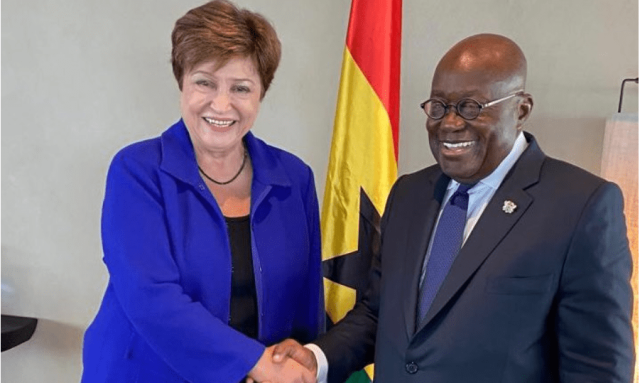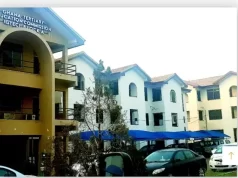The International Monetary Fund (IMF) has no mechanism to check government spending in an election year, the Dean of the Business School of the University of Cape Coast, Professor John Gatsi has said.
Prof Gatsi stated that the Fund is only interested in seeing the government spending within the items captured in the 2024 budget but has no tool to check the expenditure.
The Fund has been talking about some ambitious structural fiscal reforms that are bolstering revenue, and improving spending efficiency.
The IMF Mission Chief for Ghana, Stéphane Roudet, made reference to these two factors while observing that Ghana’s economy is improving.
He says despite a challenging global economic environment, Ghana’s economic reforms are bearing fruit, and the economy is showing signs of stabilization.
“Growth has proven more resilient than it was envisaged, inflation is declining rapidly, the fiscal and external positions have improved, Bank of Ghana’s international reserves have been increasing and exchange rate volatility has decreased,” he said while providing an update on the country’s IMF-supported programme in a video recording.
Asked for his view on this , Prof Gatsi said on the Ghana Tonight show on TV3 Friday January 19 that “He is speaking from the IMF view and they know what they put forward to the government to comply with and it seems to him that they are complying with whatever they asked the government to do. so that is what is happening. He is not concerned about the effect of multiple taxes on businesses, he is not concerned about how businesses are not productive now, he is not dstr8bed about the destructive nature of taxation to the business community, that is not what he is talking about.
“I believe he is not on the same page with the governor and with the Finance Minister. What they are looking at to conclude that the government has done very well is because they have been able to apply many taxes without any resistance.”
He added “It also baffles me when it comes to efficient expenditure, the IMF Officer said that what they know is that we have approved a budget and so long as the expenditure goes in line with the budget they are fine.
“That is also disturbing and that is the point I am making that the IMF has no tool to control the government in the election year expenditure because the IMF is only looking at the budget, so long as they are spending within items in the budget they feel comfortable, that shows that election year expenditure will definitely sway all of us.”
Professor John Gatsi further said that persons seeking to occupy the highest office of the land, the presidency, in the 2024 general elections should be concerned about the agreement reached by this government with the external creditors that paves the way for the disbursement of the $600million second tranche of the $3billion programme with the International Monetary Fund (IMF).
He says that the agreement only postpones the payment of the debt to a period when another government will be in place.
“From the pleadings and bargaining point of view, it seems they have done well by convincing the creditors to accede to the difficulties that they plunged the country into but on the second-hand governance continues.
“This government will leave office at the end of 2024, a new government will come into power and that new government has the burden of paying the debt that has been shifted to the period that they will be in in power. Largely they are only going to enjoy the external creditors agreement benefits for one year.
“Then after one year they will be saddled with the payment of debt and that should be a concern for those who are vying to become president and then form the government to rule this country,” he said on the Ghana Tonight show on TV3 Friday January 19.
This was after the Government announced that it had reached an agreement with its Official Creditors under the G20 Common Framework, on a comprehensive Debt Treatment Beyond the Debt Service Suspension Initiative.
Following the successful completion of the Domestic Debt Exchange Programme (DDEP) in 2023, this development constituted a significant positive step towards restoring Ghana‘s long-term debt sustainability, Finance Minister Ken Ofori-Atta said.
He commended the support and cooperation of its Official Creditors in reaching this agreement, which demonstrates a mutual commitment to restoring debt sustainability in line with the IMF programme targets.
The Government, he said, was confident that this debt treatment, which entails significant flow relief during the programme period, will allow for the allocation of additional financial resources towards critical public investments, particularly in healthcare, education, and infrastructure development.
The terms of the agreed debt treatment are expected to be formalised in a Memorandum of Understanding between Ghana and Official Creditors, which will then be implemented through bilateral agreements with each member of the Official Creditor Committee.
“The Government of Ghana looks forward to further engaging with the Official Creditors to ensure prompt implementation of the agreed terms,” the Finance Minister stated.
This agreement with the Official Creditors paved the way for IMF Executive Board approval of the first review of the Fund-supported programme, which allowed for the next tranche of IMF financing of US$600 million to be disbursed.
“The IMF Board Approval should also trigger World Bank Board consideration of US$300 million Development Policy Operation (DPO) financing. In addition, the World Bank is expected to support the Ghana Financial Stability Fund with US$250 million to help address the impact of the Domestic Debt Exchange Programme (DDEP) on the financial sector. These disbursements are key for Ghana’s economic recovery and ambitious reform agenda.
Ghana has indeed turned the corner, as evidenced by the: i. Decline in inflation to 23.2% in December 2023 from 54.2% in December 2022; ii. Relative strong performance of the Ghana cedi which reported a marginal depreciation of 7.2% between February and December 2023, compared to 28.4% during the same period in 2022; iii. Overall real GDP growth of 2.8% for the first three quarters of 2023, higher than the 2023 initial GDP growth target of 1.5%.









![“It’s hard to say goodbye” – Christian Atsu’s wife composes emotional tribute song for him [Video]](https://ghananewss.com/storage/2023/05/Christian-atsu-and-wife-100x75.jpeg)







